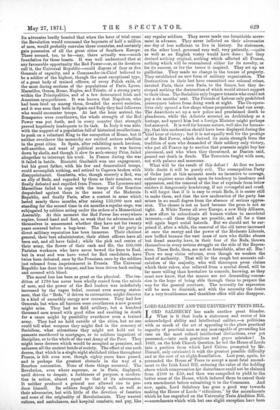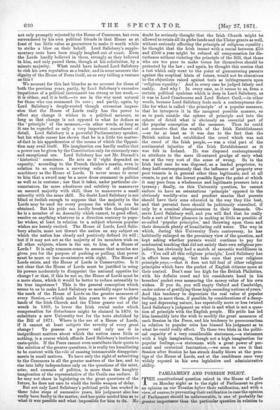LORD SALISBURY AND THE UNIVERSITY TESTS BILL, L ORD SALISBURY has
made another great blunder. What is it that leads a statesman and orator of his acknowledged ability and intellectual calibre,—a politician with as much of the art of appealing to the plain practical sagacity of practical men as any man capable of grounding his case on the most refined intellectual distinctions, ever yet possessed,—into such gratuitous and grave mistakes In 1869, on the Irish Church Question, he led the House of Lords into a position from which Lord Cairns, prompted by Mr. Disraeli, only extricated it wh the greatest possible difficulty and at the cost of no sligh umiliation. Last year, again, he persuaded the HouseofPeers to accept a most fatal amend- ment to the Irish Land Bill, reducing the value of the holding above which compensation tor disturbance could not be claimed from £100 to £50, and then was compelled to yield to the better sense of the House, which induced them to cancel their own amendment before submitting it to the Commons. And now, again, Lord Salisbury has gone a good way towards making the House of Lords "ridiculous," by the amendments which he has engrafted on the University Tests Abolition Bill, —amendments which with but one slight exception have been
not only promptly rejected by the House of Commons, but even surrendered by his own political friends in that House as at least of too little value as guarantees to make it worth while to strike a blow on their behalf. Lord Salisbury's supple- mentary tests have been simply laughed out of court. Even the Lords hardly believed in them, strongly as they believed in him, and only passed them, though at his solicitation, by a minute majority. What could have induced Lord Salisbury to risk his own reputation as a leader, and in some measure the dignity of the House of Peers itself, on so very trifling a venture as this ?
We account for this last blunder as we account for those of both the previous years, partly, by Lord Salisbury's excessive impatience of a political instrument too strong or too weak,— it is either, and it is both,—to use in the way most natural for those who can command its uses ; and partly, again, by Lord Salisbury's deeply-rooted though erroneous impres- -sion that the House of Lords really has the power to effect any change it wishes in a political measure, so long as that change is not opposed to what he defines as the 'principle' of the measure,—in other words, so long as it can be regarded as only a very important amendment of detail. Lord Salisbury is a powerful Parliamentary speaker, but his whole career has shown that he is a little too matter- of-fact in his apprehension of the means of which the Opposi- tion may avail itself. His imagination can hardly realize that a power can be given by the Constitution only for extremely rare and exceptional use. Lord Salisbury has not Mr. Disraeli's 'historical' conscience. He acts as if right depended on capacity,' according to the French thinker's maxim, even in relation to so curious a surviving relic of old political machinery as the House of Lords. It never seems to occur to him that a sword may be a mere dress ornament in politics as well as in costume ; nor that it takes, under particular cir- cumstances, far more adroitness and subtlety to manoeuvre an assured majority with skill, than to naanceuvre a small minority with the same skill. No doubt Lord Salisbury is not blind or foolish enough to suppose that the majority in the Lords may be used for every purpose for which it can be obtained. But his pride can hardly brook the thought that he is a member of an Assembly which cannot, to good effect, resolve on anything whatever in a direction contrary to popu- lar wishes, at least. in relation to a subject whereon popular wishes are keenly excited. The House of Lords, Lord Salis- bury admits, must not thwart the nation on any subject on which the nation has clearly and positively defined its will; but if it may not act as the majority of its members wish on all other subjects, where is the use, to him, of a House of Lords It is only common-sense to assume that muscles are given you for the purpose of pushing or puffing, that power • must be more or less co-extensive with right. The House of Lords exists, and the House of Lords is Conservative. Is it not clear that the House of Lords must be justified in using its powers moderately to disappoint the national appetite for change ? or that, if this be not so, the House of Lords must be a mere sham, which it would be better to reduce ostensibly to its true impotence ? This is the general conception which seems to us to make Lord Salisbury so morbidly eager to leave the mark of the House of Lords on the greater measures of every Session,— which made him yearn to save the glebe lands of the Irish Church and the Ulster grants out of the wreck in 1869, to lower the Irish rental under which compensation for disturbance might be claimed in 1870, to substitute a new University test for the tests abolished by the Bill of 1871. Where is the use of a House of Lords, if it cannot at least mitigate the severity of every great change ? To possess a power and only use it in insignificant matters about which the nation cares little or nothing, is a course which offends Lord Salisbury's instinctive caste-pride. If the Peers cannot even contribute their quota to the solution of the greater questions, it is really too humiliating to be content with the role of causing innumerable disappoint- ments in small matters. To have only the right of submitting to the Commons in all the greater matters of the law, and to rise into lofty independence only on the questions of the mint, arise, and cummin of politics, is more than the haughty imagination of the representative of the Cecile can endure. If he may not share in legislating on the great questions of the future, he does not care to wield the feeble weapon of delay.
But not only Lord Salisbury's political pride has worked in these false steps of successive years, his judgment also has really been faulty in the matter, and has quite misled him as to what it was possible and what impossible for him to do. No
.doubt he seriously thought that the Irish Church might be allowed to retain all its glebe lands and the Ulster grants as well, without seriously affecting the principle of religious equality ; he thought that the Irish tenant with a rental between £50 and £100 a year might be refused all compensation for dis- turbance without violating the principle of the Bill, that those who are too poor to make terms for themselves should be protected by the law ; and again, he thought this session that a test which only went to the point of guaranteeing parents against the sceptical hints of tutors, would not be obnoxious to the objections raised against tests as infringements upon religious equality.' And in every case he judged falsely and rashly. And why ? In every case, as it seems to us, from a certain political cynicism which is deep in Lord Salisbury, as it PM in Lord Cranbourne and Lord Robert Cecil,—in other words, because Lord Salisbury feels such a contemptuous dis- like for what is called the principle' of a popular measure, that he interprets it in the meagrest possible manner, so as to push outside the sphere of principle and into the sphere of detail what is obviously an essential part of the popular conception of the measure. Thus he could not conceive that the wealth of the Irish Establishment —so far at least as it was due to the fact that the British nation had established the creed which was not the creed of the Irish people, — was a vital part of the sentimental injustice of the Irish Establishment as it was felt in Ireland. He was disposed contemptuously to attribute to the mere ill-natured grudge of envy what was at the very root of the sense of wrong. So in the Irish land case he was disposed, as a landed proprietor, to deny half-contemptuously that the influence of property over poor tenants is in general other than legitimate, and at all events, to put at the lowest possible figure the point at. which it may pass from a wholesome and legitimate pressure into a tyranny ; finally, on this University question, he cannot endure to have an ostentatious 'principle' opposed to the obviously worldly-wise and prudent maxim that parents should have 'their sons educated in the way they like best, and that parental fears should be judiciously consulted, if only by a nominal obsequiousness to their demands. Ob- serve Lord Salisbury well, and you will find that he really feels a sort of bitter pleasure in making as little as possible of so-called popular principles,' and throwing upon them and their demands plenty of humiliating cold water. The way in which, daring this University Tests controversy, he has habitually enlarged on the pecuniary view of the question, and kept asking whether parents would continue to pay for academical teaching that did not satisfy their own religious pre- judices, has obviously had a snatch of sarcastic worldliness in it. 'You call all this religious principle,' Lord Salisbury has in effect been saying, bat take care that your religious principle pays,—that it does not fall foul of other religious principles which have the pocket of English citizens more at their control. Don't soar too high for the British Philistine, with his definite creed and his considerate hand in his breeches' pocket ever measuring the money value of his own wishes. If you do, you will empty Oxford and Cambridge, under colour of gratifying these high-sounding notions of yours.' And this tendency to depreciate the real value of popular feelings, to meet them, if possible, by considerations of a damp- ing and depressing nature, has repeatedly more or less twisted Lord Salisbury's jtidgment on what is and what is not a ques- tion of principle with the English people. His pride has led him insensibly into the wish to modify the great measures of each Session in the Peers, and his tendency to pococurantism in relation to popular cries has biassed his judgment as to what he could really effect. To these two blots in the politi- cal capacity of a very considerable statesman,—a statesman with a high imagination, though not a high imagination for popular feelings,—a statesman_ with a great power of per- sonal and oratorical fascination,—we seem to owe it that Session after Session he has struck deadly blows at the pres- tige of the House of Lords, and at the confidence once very widely reposed in his own legislative and administrative ability.



































 Previous page
Previous page